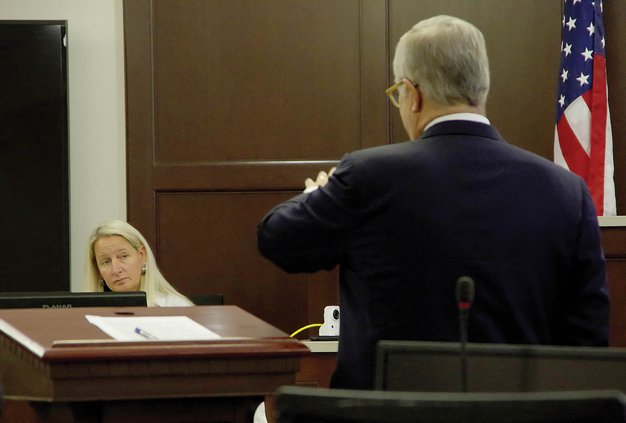“Justice for Meko. Justice for Little Boy. Guilty on all counts.”
Those words were spoken by Assistant District Attorney Michael Mahoney after two days of emotional testimony in the case of State of Georgia vs. Michelle Louise Root.
On Wednesday, Mahoney and defense attorney Rafe Banks III presented their final witnesses, evidence and arguments to a jury that has been tasked by Superior Court Judge David L. Dickinson with determining whether the state successfully proved that the defendant maliciously caused the deaths of two dogs, Meko and Little Boy.
Root, 44, of Hall County, the former owner of Paw’sh Paws in Cumming, was arrested on Oct. 11 and 18, 2017, and later pleaded not guilty to two charges of aggravated cruelty to animals.
During Wednesday’s proceedings, Root herself took the stand, walking the jury through her upbringing in Oxford, England, in a military family, growing up and working with animals into her adulthood and finally giving her account of the events on Oct. 7, 2017, that eventually led to her arrest.
Root stated that before opening Paw’sh Paws, she worked as the Salon manager for a Petsmart in Cumming for nearly 11 years, leaving only after an incident where she allegedly walked in on a manager “having relations” with another employee.
In addition to Root, Banks called two other witnesses, Root’s husband, Chris Garrett, and a former Paw’sh Paws employee, Tina Black.
All three witnesses recounted a version of the events of Oct. 7, 2017, that deviated from the state’s version on several key points.
According to testimony from Root and Black, on Oct. 7, 2017, two dogs, Meko and Max, were brought in to the groomer for the first time, were washed, dried and put back in their cages.
At about 3 p.m., Meko was allegedly brought out of his cage, put on a leash and brought to the front of the establishment. That’s when the problems allegedly started.
“Mrs. Root commenced to grooming him ... She got almost halfway through him and he commenced to flipping out, misbehaving, acting up and at that point, he came out of the groomers loop and took off towards the back and was snapping and biting,” Black said in her testimony.
Disputing what multiple witnesses, including Root and Black, reportedly said in written statements to police and stated under oath about Meko’s mild temperament, Black told the court that Meko continued to struggle and act aggressively when she and Root managed to get him back on the groomer's table.
“I believe it was at that point that he bit her on the arm,” she said.
Black, Root and Garrett constantly stated in their testimony that Meko continued to “alligator roll” in his leash, and eventually slipped off the table with his back legs, hanging by his neck and flailing for an unspecified amount of time.
On cross-examination, Mahoney pointedly asked Root that if she knew Meko had fallen off the table and knew the dog had died, why did she not put that in her written statement to police during her arrest.
"Isn't it obvious what happened here ladies and gentlemen?” Mahoney said. “The defendant makes no statement about the dog falling off the table or flailing around or violence. Tina Black in her statement to police makes no mention of a dog falling off the table or flailing around or violence. Chris Garrett is the only one that had the wits to make up a statement.”
"Ladies and gentlemen, they have circled the wagons."
According to Mahoney's recounting of the medical examination done of Meko’s body by Doris Miller of the University of Georgia College of Veterinary Medicine, for the dog to have died by choking, it would have had to have hung off the table for between 5 to 12 minutes.
Beyond the question of strangulation, Mahoney stated that the defendant’s series of events did not corroborate with the other hemorrhages on Meko’s legs, abdomen, head, shoulder and neck or the damage to his brain, lungs and other body parts that were detailed in the UGA report.
"The injuries on Meko line up exactly with what Lisa Riles and Heather (Garner) say," Mahoney said. "That's why you should believe them and not the three others that testified today."
In his closing arguments, Banks hammered several points that he made previously in testimony and cross-examination about inconsistencies that he saw in the statements of witnesses Lisa Riles and Heather Garner, doubts brought up about the testimony of several Petsmart employees, and errors in how the Cumming Police Department handled the investigation.
"A minor point, but minor points start adding up," Banks said "That's why I harped on the police department on what could have been done, should have been done, ought to have been done, but wasn't done. The information they could have provided to you, but haven't."
Banks also stated that in his estimation the state failed to prove through evidence its second charge that Root had anything to do with the death of Little Boy and explained that even though Meko allegedly died in Root’s care, that does not automatically mean she is responsible for maliciously killing the animal.
"What you will find is, it was an accident,” Banks said. “Yes, it's tragic, and it's certainly unfortunate, but nobody intended for Meko to die."
After deliberating for over an hour, the jury returned with two requests: To continue deliberating in the morning, and a request to “be provided examples of what is and isn’t malice.”
Dickinson granted the first request, agreeing to send the jury home until 8:30 a.m. on Thursday, but denied the second request, instead telling the jurors to consult their jury instructions on the topic of malice.

